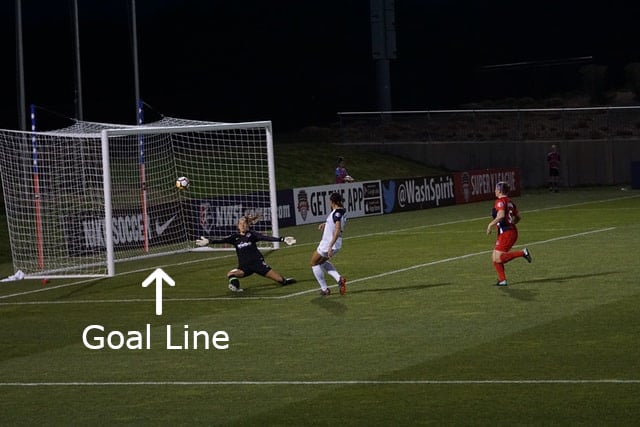When people write blog posts about soccer, many tend to miss the fact that some people know nothing about soccer, so they write as if the reader already knows the very basic soccer fundamentals.
I decided that I’m not going to do that in this article. In other words, this article will answer questions that are super beginner friendly for all the people out there who are interested in learning more about soccer.
I have already written a long article explaining what soccer is and how it is played, but in this article, I’ll be answering the most beginner friendly questions that a person interested in soccer might have. So let’s get started.
How is a goal scored in soccer?
A soccer game is a competition between 2 teams. Each of these 2 teams have their own net.
A goal is scored when the whole soccer ball crosses the goal line and lands inside the soccer net. If the ball goes inside the net of team A, then it means that team B have scored a goal.

It doesn’t matter who landed the ball inside the net. As long as no rules have been broken during the attempt to score the goal, the goal will be rewarded.
For example, team A can score a goal against themselves if they want to, the rules do not prevent that. There have been many soccer players who have scored against their own team by mistake.
It also does not matter which player scored the goal. Even the goalkeeper can score a goal in soccer against their opponent.
So, if the ball crosses the goal line and goes into the net, it’s a goal.
How many points are awarded per a soccer goal?
Unlike in many other popular sports, if you score a goal in soccer, you only get one point no matter how the goal was scored.
If you are American, then you might have gotten used to the points systems that are used in the most popular American sports.
Sports like Basketball and American Football reward the teams a different number of points based on the way they score.
However in soccer, no matter how a goal is scored, only one point is rewarded. If you score with a header, a free kick, a bicycle kick, a penalty kick and so on, you’ll only get one point.
How is the soccer match winner determined?
Like in many other popular sports, in soccer, the team who has scored the most number of goals after the game ends is announced as the winner of the match.

The main time of a soccer game is 90 minutes and after these 90 minutes end, the game ends and the team with the most amount of goals wins the match.
But what if the game ends in a tie? Some soccer games can end in a tie, and other games can’t.
If the match is a soccer league match, then the game ends in a draw after the official time of the game ends.
However, if the game is a knockout match, meaning that the winner advances to the next stage and the loser gets out of the competition, then an extra time is played and later penalties if the result remains a tie.
If you are interested more in what happens after the official time of the match ends, you can check this article out.
But to summarize it, if the match should have a winner, then after the official 90 minutes of the game, 30 extra minutes will be played if the score remains a tie. If after the 30 minutes, the score remains a tie, then the game stops and each team gets 5 penalty kicks. The team that scored more penalty kicks wins the game.
There are also 2-legged soccer matches but I won’t dive into them here since I want to keep this article as beginner friendly as possible. In case you’re interested in learning more about the 2-legged soccer matches though and how the winner is decided in these kinds of matches, I have written a full explanation here.
How many goals are usually scored in a soccer match?
In soccer, there aren’t a lot of goals scored per match. Many professional soccer matches end with only one or two goals scored. Some end with zero goals scored.
While there are some soccer matches that end with more than 8 goals scored, most soccer matches end with less than 4~5 goals scored.
There are many reasons behind the low number of soccer goals per soccer match. Some of these reasons are the size of the soccer field, the size of the nets and so on. You can learn more about this in this article.

